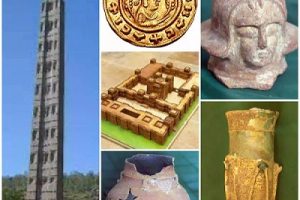Be it in English, French, or any of the widely spoken languages, an expression involving the word ‘Black’ is almost automatically associated with undesirable things and situations. To mention a few blackmail, black sheep, black market, black list, etc. However, as in every case, there are a few exceptions. In Amharic, for instance, there is an expression that means ‘Black Guest’. Ethiopians use the expression to describe their guest, who deserves an extraordinary welcome and treatment.
Well, last week Ethiopia was busy hosting a ‘black guest’, the leader of the UAE, Mohammad bin Zayed Al Nahyan, MBZ. The welcoming ceremony accorded to the sheikh was, to say the least, unprecedented and unparalleled over recent decades. Yellow daisy-patterned carpets, 21-gun salutes, cavalry escorts, brotherly hugs and handshakes, and awesome processions were all impressive and eye-catching events that became the talk of the town. It was a rare royal reception accorded to a foreign head of state.
Shiekh Mohamed himself expressed his appreciation of his visit to Ethiopia by writing, “I was pleased to meet Abiy Ahmed in Addis Ababa to discuss strengthening bilateral ties to serve the aspirations of our peoples through economic and sustainable initiatives. The UAE is committed to building bridges of cooperation that foster prosperity and stability for all.”
The UAE leader deserves the warmest welcome he was accorded, as his country under his leadership proved itself to be a real friend to Ethiopia, standing by her side at the time of her needs, not once but on several occasions during the turbulent transition period in which it endured several political and economic challenges.
The crucial point that should be underlined is that the UAE stood by Ethiopia’s side in those difficult times in defiance of the concerted pressure of several major world powers that were imposing economic sanctions against Ethiopia. Ignoring world powers’ advice has consequences, and sooner or later would not be left unanswered. However, UAE leaders stood their ground and maintained their support for Ethiopia.
During the trying time of two years during which the conflict in northern Ethiopia had been raging on, the UAE was one of the few trusted allies that supported the united forces of patriotic Ethiopians to overcome a dangerous situation that posed an existential threat to the nation.
It is also to be recalled that the UAE leaders have played a supportive role in facilitating the peace initiative of the Ethiopian Premier in finally ending the Ethio-Eritrean war with the signing of a Joint Declaration of Peace and Friendship in Asmara back in July 2018. Two weeks after the signing of the peace declaration, Shiekh Mohamed invited both the Ethiopian and the Eritrean leaders to his palace and honored them with the “Order of Zayed”, the highest civil honor in UAE.
There was also a tripartite summit held among Ethiopia, Eritrea, and UAE, during which Shiekh Mohamed pledged his support for the peace agreement in the interest of maintaining a proper relationship between the two countries in a framework of good neighborliness and respect for international law.
State Foreign Affairs Minister, Mesganu Arega reiterates that the UAE is a time-tested friend and has built a strategic relationship with Ethiopia. “Our relationship with the UAE is vast and deep. We have agreed on several areas of bilateral cooperation. Moreover, the leaders of the two countries have strong confidence in each other and build close friendships. The diplomatic ties between the two countries have grown from regular to strategic. In previous times, we had ten bilateral agreements; now this week, we have made 17 additional new agreements. This is huge. It signifies the depth and the diversification of the areas of cooperation the two countries are engaged in” he says.
The statistical figures conform to what the Mesganu describes. Last year’s report indicates the non-oil trade volume between the two countries reached USD 1.4 billion in 2022. The Ethio-UAE non-oil trade has surged by 180 percent over the last 10 years. Besides, about 130 UAE companies are active in Ethiopia, working in various sectors of investment. Out of these companies, most of them are huge companies with international reputations. UAE companies are active in the fields of real estate, trade, aviation, renewable energy, agriculture, mining, logistics and infrastructure, health, education, environment, and technology.
Being a young nation of a little over half a century, the UAE’s history of diplomatic relations with Ethiopia only dates back three decades. However, the relationship between the two countries has taken a sharp upward trajectory in the last five years, after the incumbent reformist government took power in Ethiopia. A study paper on Ethio-UAE relations that was written two years ago asserts: “After [the onset of] the current Ethiopian reform and the coming of Abiy Ahmed to power as Ethiopia’s reformist Prime Minister in 2018, the UAE has become Ethiopia’s strategic partnership in economic aspects such as trade and investments and also politics.”
It was a little over a month after taking office that the Ethiopian Premier paid a visit to the UAE. That was the first ever visit he made outside Africa as a head of government, signifying the priority his government’s foreign policy gave to the Gulf States.
The success of his first visit to UAE in May 2018 was immediate and resounding in that, only three weeks later the UAE leader, MBZ reciprocated by landing in Addis Ababa with his encouragement of senior ministers to pay a 2-day visit. The surprise did not end there. A day later, the UAE announced 3 Billion dollars in financial support in aid and investment to Ethiopia. The much-needed aid can be considered as a rescue package, and could not come at a better time. At that uncertain time of transition, the total foreign exchange left in the government’s coffers was said to be equivalent to less than one month’s worth of imports.
Following that diplomatic event, the relations between the two countries went on the fast track to an advanced level to where it could be considered as a benchmark for Middle-East-African relations. During the last five years, the Ethiopian premier has visited UAE at least five times and the UAE leader has paid a visit to Ethiopia two times.
The slogan written at the backdrop of the stage where Ethiopian and UAE senior officials recently signed 17 bilateral agreements reads “profound cooperation for mutual property”. Indeed, the cooperation between the two countries is not a one-way donor-receiver kind of relationship. The UAE needs Ethiopia as much as Ethiopia needs the UAE.
Ethiopia needs the UAE’s capital inflow to finance the huge development projects it plans to accomplish in its ten-year development plan. It also wants to share the skills and experience of UAE success in real estate development, logistics, and the hospitality industry.
On the other hand, as the UAE is an oil-rich nation, Ethiopia is rich in water and agricultural resources. What Ethiopia has is what the UAE and Middle Eastern countries want to secure badly. As the Ethiopian economy relies on imports of oil 90 percent of UAE food relies on imports. The unrivaled geographical proximity of vast agricultural resources in Ethiopia to the Arab world makes it the most desirable development partner.
The other major point that makes Ethiopia a desirable strategic partner for the UAE is its shared interest in the vital trade route of the Red Sea region which increasingly attracts the interest and competition of world powers. Both countries have a firm belief that the region should be free from the influence of religious fundamentalists and be a peaceful trade route linking the West and the East.
It appears that Ethio-UAE relations could have a significant impact on the Horn’s peace and development and facilitate better relations among the nations of the Middle East with the nations in the Horn.
BY SOLOMON WASSIHUN
THE ETHIOPIAN HERALD THURSDAY 31 AUGUST 2023





